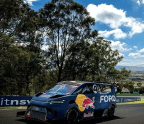Forward thinking



Look at any area of modern life and the term artificial intelligence (AI) is being thrown around with abandon. A toaster that claims to use AI to predict the level of charring, or a fridge that criticises your dietary habits? These are of spurious applications, of course, but AI and its subset, Machine Learning (ML), are key to many applications now taken for granted.
The most obvious of these are smart assistants, such as that Amazon Alexa, or the awful filters that can be applied to pictures and videos in some chat apps, both of which rely on AI. However, it is also starting to be leveraged in motor racing, automating a variety of tasks that traditionally suck up considerable amounts of engineering resources.
But what actually is AI?
The classical meaning of artificial intelligence is laid out in the Turing Test, defined by famed British code breaker, mathematician and father of modern computer science, Alan Turing. In the late 1940s, he suggested the possibility of a computer that could learn from experience and in an unpublished paper of 1948, Intelligent Machines, laid down ideas for elements such as neural networks, which are now one of the foundation stones of modern AI.
Turing’s test for whether true AI is achieved relies on a human interrogator, a human foil (who can
You’re reading a preview, subscribe to read more.
Start your free 30 days



